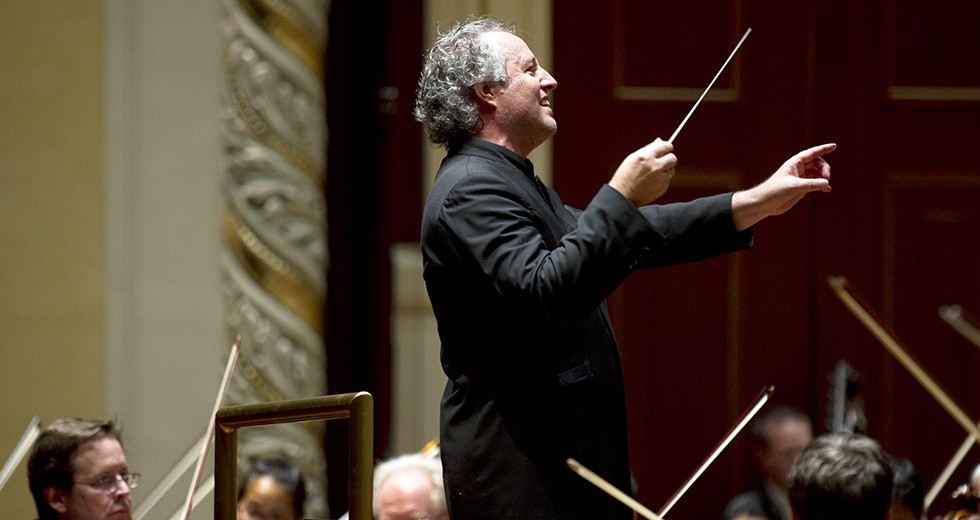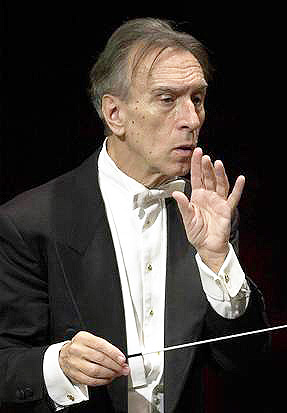
Since European visits by the Chicago Symphony Orchestra remain rare and special events, Austrian conductor Manfred Honeck made a point of attending one of the CSO’s four sold-out concerts last month at Vienna’s renowned Musikverein as part of its recent fall tour. Having led the CSO on multiple occasions, the respected maestro was already a big fan of the ensemble and Riccardo Muti, its music director, but even he was surprised by what he heard.
“What I realized in Vienna was the sound of the orchestra,” he said. “Of course, the Musikverein is always beautiful. It’s amazing how the orchestra was able to settle into a certain accord with [the hall’s acoustics], and at the same time, never overplayed the hall. It was wonderful. The warmness of the strings was beautiful, and these great soloists in all sections. I was very amazed, very enthusiastic and very inspired.”
With those memories still fresh in his mind, Honeck will return as a guest conductor for CSO concerts Dec. 11-16, interrupting the month’s largely holiday musical fare with a solidly Austro-German program that culminates in Beethoven’s Symphony No. 7.
Honeck, 56, who grew up in Austria, is deeply steeped in such repertoire; he studied at the Academy of Music in Vienna and performed for 10 years as a violinist and violist in the famed Vienna Philharmonic and Vienna State Opera Orchestra. His time in those two ensembles, he said, has helped him as a conductor to understand how orchestras function and how to be an ensemble player. But perhaps most important, he said, he had an up-close opportunity to watch such legendary conductors as Leonard Bernstein, Herbert von Karajan, Carlos Kleiber and Georg Solti in action. “I really studied every one of them, and I really think that was my best conducting school.”
Another of the famous conductors he played under in Vienna was Muti. “I think you have the best music director,” Honeck said. “Riccardo Muti is such a wonderful person and a great musician and great leader.” In preparation for a production at the Vienna State Opera, Honeck even worked up the courage to ask Muti if he could sit in on a rehearsal with the singers, and the maestro consented. “I admired him,” Honeck said. “He always made fantastic, lively music.”
After the CSO concert he recently attended in Vienna, Honeck was quick to go backstage afterward to offer his regards to Muti.
But as much as loved his time as an orchestra musician, Honeck wanted the opportunity to be able to stand before such an ensemble and influence it in a way he never could as an individual player. So in 1990, he left the Vienna Philharmonic to pursue a conducting career. “It was somehow a crazy decision, but I had to do it,” he said. “There was no discussion.”
He began as an assistant to Claudio Abbado and conducted regularly at the Zurich Opera from 1991 to 1996. Other stops along his career path have included stints as music director of the Swedish Radio Symphony Orchestra from 2000 to 2006 and of the Staatsoper Stuttgart from 2007 to 2011. In 2008/09, he took over the same post of the well-respected Pittsburgh Symphony Orchestra. His contract has since been extended through the 2019/20 season, a testament to the success he has enjoyed there, including multiple recordings and several European tours.
Honeck likes to conduct in the United States, because he finds the musicians here to be “extremely professional,” showing up at rehearsals fully prepared and ready to make music. Such preparation means he can quickly get beyond just getting the notes right and focus on building a meaningful interpretation. “I’m not the type of conductor who wants to see a performance where everything is together and just go home,” he said. “This is not my style, because I distinguish between technical perfection and musical perfection. And to get 100 people in front of you to a musical perfection, that’s actually what I always want I gain. And the Pittsburgh Symphony was extremely responsive, and they were hungry for making music.”
Unlike European orchestras, which are largely state-funded, those in the United States rely mostly on private support. So a music director of an American orchestra, Honeck said, is called on to be part of fund-raising efforts. While this can be a distraction from music-making, he said, it has the advantage of allowing the conductor get to know an orchestra’s financial backers. “To get a personal relationship with them is something really wonderful,” he said.
Honeck first conducted the CSO in 1995 at the Ravinia Festival, where he substituted on short notice for James Conlon. His first CSO subscription concerts came in February 2002, and he has returned regularly since.
The Austrian conductor is best known for trying to reinvigorate well-known repertoire — a practice that has brought him praise for the quality of many of his interpretations but also occasional criticism for not juxtaposing the chestnuts with newer works. For his CSO program in December, he will conduct two highly familiar works: Richard Strauss’ tone poem Don Juan, and Beethoven’s Symphony No. 7. “I can’t wait to do this with the Chicago Symphony,” he said of the latter piece, “because I still believe it’s a fantastic symphony, one of the greatest symphonies, and hopefully, to bring some new things to it as a conductor.”
Rounding out the program is Haydn’s Symphony No. 93, one of the well-known composer’s lesser-known symphonies. Honeck describes it as chamber music-like and witty, and indeed, he believes that Beethoven was looking back at Haydn when he introduced bits of humor into his Seventh Symphony. The Haydn work has been performed just twice before by the CSO, most recently in 2006/07. The 1791 work is one of the composer’s 12 so-called London symphonies, because they were premiered during two concert seasons in that city. “Because there are 104 [enumerated] symphonies by Haydn,” Honeck said, “not every symphony is played, and I’m not sure how many times [any of them] is played, anyway, because Haydn, compared to Beethoven and Mozart, is one of those composers that people don’t program so much.”
The ongoing potential to discover new things in old works is an aspect of the symphonic world that continues to drive Honeck. “It is never boring to do a Beethoven Seven again,” he said. “It still seems like there is room for new things, and that excites me enormously, and it always makes me happy that people understand that.”
Kyle MacMillan, former classical music critic of the Denver Post, is a Chicago-based arts writer.
